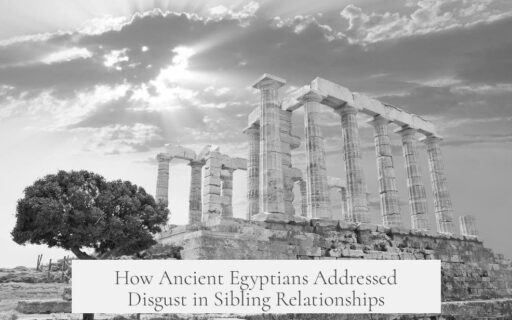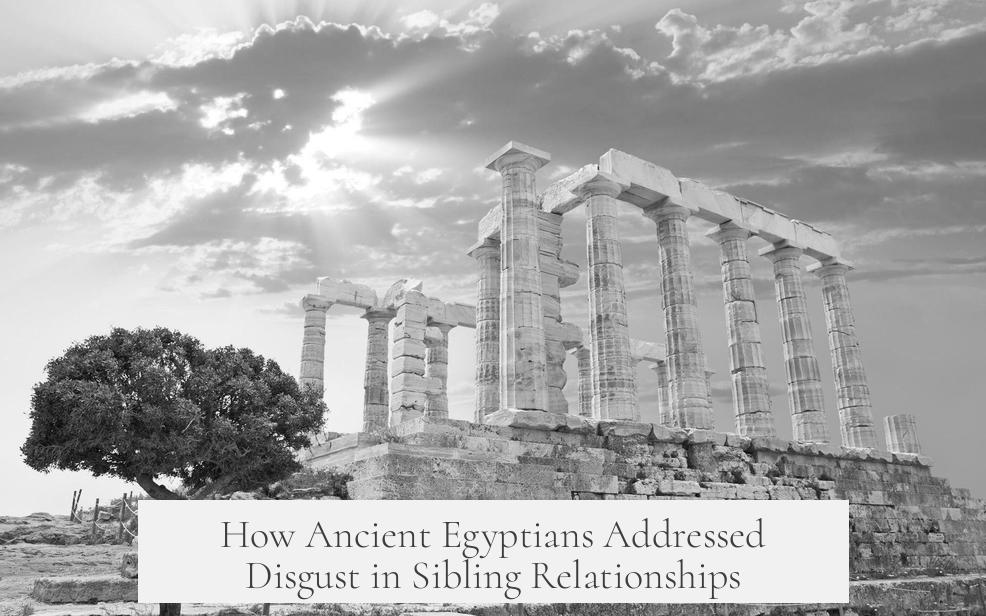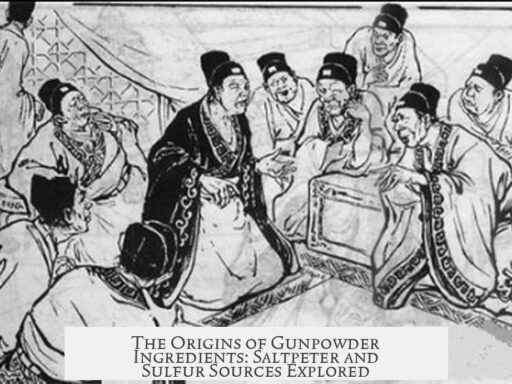In cultures like ancient Egypt where brother-sister incest was practiced, feelings of disgust commonly associated with such unions in modern contexts were generally absent due to strong cultural, religious, and social frameworks that normalized and sanctified these marriages.
Ancient Egyptian royalty often married siblings to preserve a pure royal lineage. This practice was institutionalized, not taboo. Since it was closely tied to divine and dynastic ideology, the idea of disgust did not arise as it does in many present-day Western societies.
People grew up socialized within these norms. From childhood, they learned that sibling marriage was sacred and necessary. This early socialization removed typical biological aversions. Instead, sibling marriage was framed as a duty to maintain dynastic stability and divine favor.
Religious beliefs played a key role. Pharaohs were seen as divine or semi-divine beings. Their marriages mirrored those of gods who were often siblings too, such as Isis and Osiris. This spiritual framing shifted perceptions away from physical or emotional discomfort towards reverence and ritual importance.
Historians find no surviving Egyptian texts that express emotional discomfort or disgust about these unions. This silence suggests either such feelings were not common or considered inappropriate to record. The societal focus remained on the symbolic and political functions of these marriages.
Anthropologists explain that feelings of disgust toward incest are highly culturally variable. Where incestuous marriage is embedded within strict social rules and religious meaning, repulsion diminishes. Functionalist analysis supports this: the goal of lineage preservation and divine legitimacy took precedence over individual emotions in ancient Egypt.
- Royal sibling marriages were normalized and vital to Egyptian dynastic and religious goals.
- Cultural socialization erased natural aversions by framing these unions as sacred.
- Religious myths of divine sibling marriages reinforced acceptance.
- No historical records indicate emotional disgust was common or recorded.
- Anthropology notes disgust from incest varies greatly by culture and context.
How Did People in Ancient Egyptian Cultures Get Over the Disgust of Brother-Sister Incest?
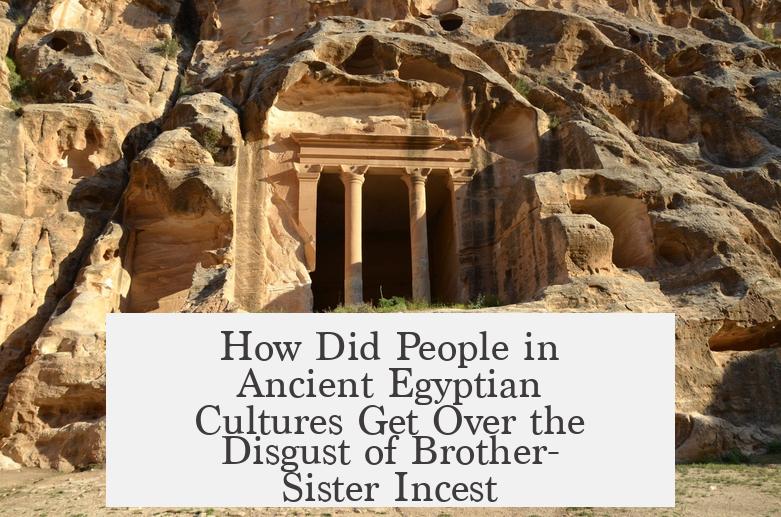
In Ancient Egypt, feelings of disgust toward brother-sister incest didn’t pop up like they might in modern cultures, mainly because the practice of sibling marriage was deeply normalized and interwoven with religion and royalty. This wasn’t taboo but tradition, and that changes everything. Curious how that worked? Let’s dive in.
If you grew up learning that marrying your sibling was not just acceptable but part of your divine right as royalty, does it even register as gross? Probably not. The key here is context—ancient Egyptians didn’t view sibling unions like we tend to do today.
1. Context and Cultural Norms Shape All
First off, it’s important to remember that sibling marriage in ancient Egypt wasn’t some rogue family’s quirky habit. It was widespread, especially among ruling dynasties. Pharaohs often married their sisters to keep bloodlines pure. This practice had religious and dynastic importance:
- The pharaoh was seen as a living god. Brother-sister marriage echoed the divine relationships of gods like Osiris and Isis, who were siblings and spouses.
- Keeping the bloodline “pure” preserved spiritual and political power.
In other words, sibling incest was institutionalized. This means that disgust—common today—is not just a biological reaction but culturally programmed. Ancient Egyptians had a whole different social script.
2. Psychological and Social Reframing: No Room for Disgust
Feeling disgusted by something often depends on what society teaches us to feel. Ancient Egyptians were socialized from birth inside this culture of sibling marriage. Instead of “eww, my sibling?!”, they probably thought, “This is my sacred duty.” How does that happen? A mix of cultural indoctrination and religious ideology.
Here’s a quick breakdown:
- Cultural Indoctrination: Kids grew up accepting sibling marriage as normal. Rituals, stories, and education didn’t frame such unions as taboo.
- Religious Framing: Pharaoh’s sibling spouse was more than a partner—they were part of a divine mythos. This shifted the relationship from erotic or familial to sacred, like embodying gods on earth.
So, disgust might not even register emotionally because the relationship is spiritualized. When the culture paints such unions as holy, feelings like repulsion take a back seat.
3. What Did the Ancient Egyptians Themselves Say About It?
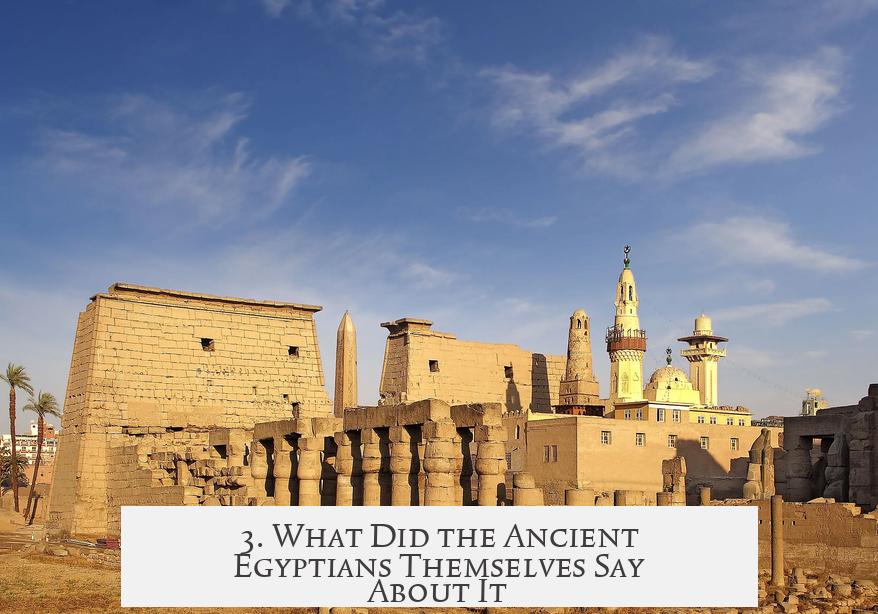
Here’s the kicker: there are no surviving ancient Egyptian texts or documents explicitly stating any feelings of emotional distress or disgust related to sibling marriage. And that absence is telling. Ancient writers often focused on laws, rituals, myths, not emotional complaints.
Could it be that people genuinely didn’t feel weird about it? Or maybe it wasn’t something to discuss openly? Both possibilities tell us that the modern Western concept of incest disgust doesn’t map neatly onto ancient Egyptian life.
4. Modern Anthropological Insights: It’s All About Culture
Anthropologists today observe that disgust about incest isn’t universal. It’s deeply cultural. In societies where sibling marriage is routine and entwined with powerful social rules, the sense of repulsion fades or never appears.
Think of it like this:
- If you grow up seeing sibling marriage as sacred, do you feel the same cringe? Probably not.
- Over time, social systems and religious beliefs work as psychological filters, blocking or rewiring those natural reactions.
- In Egypt’s case, royal sibling marriages boosted political legitimacy and religious symbolism, making personal feelings less relevant.
Modern scholarship calls this a “functionalist” approach: cultural practices serve societal goals, sometimes overriding individual emotions.
5. Could We Imagine Living That Way?
Putting ourselves in the shoes of ancient Egyptians is tricky. We come with centuries of cultural baggage that says “eww” the moment we hear about sibling marriages. But ancient Egyptians had a different mindset. Their beliefs shaped what was normal and what was sacred.
Imagine growing up in a society where what your rulers and gods do sets the social standards. Your sibling is also your divine partner, chosen by tradition to maintain cosmic order. When your whole worldview supports this, feelings like disgust lose much of their power.
6. What Can We Learn Today?
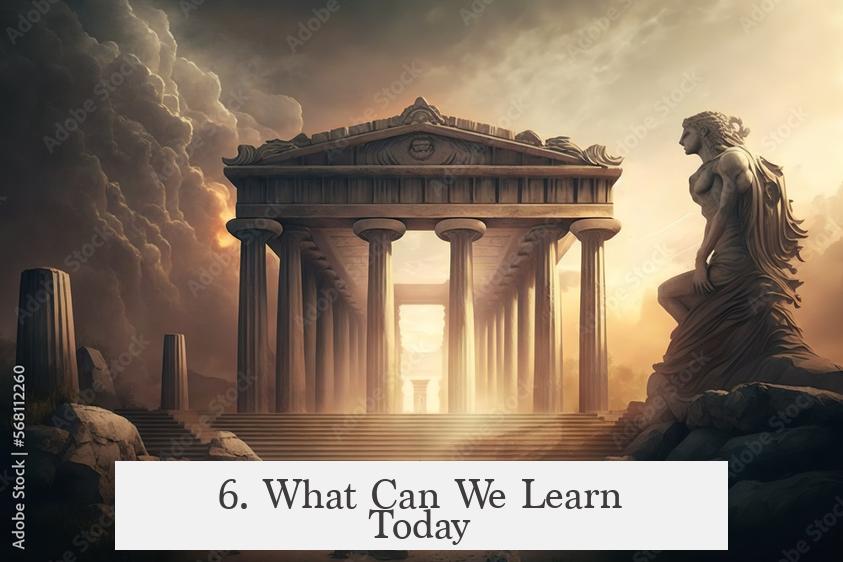
This story shows how emotions like disgust are deeply tied to culture. We often think they’re universal and hardwired, but history and anthropology prove they’re malleable. Understanding this helps us avoid quick judgments about other cultures. It also reveals how powerful social and religious systems are in shaping what we feel and accept.
If you find the idea of sibling marriage repulsive, remember: ancient Egyptians probably didn’t. Their cultural context changed the game totally.
In sum, from normalization through socialization, ideological reframing, and lack of any explicit historical record of disgust, people in ancient Egypt overcame any potential unpleasant feelings about sibling marriage by not seeing it as unnatural or wrong at all.
Final Thoughts
Modern Western readers might ask, “How did they get over the disgust?” The answer is—they didn’t need to. Their worldview made that disgust irrelevant. It’s a fascinating reminder that our emotions tie tightly with cultural stories we inherit.
Next time you hear about a culture with practices wildly different from yours, pause and ask: What stories shape their feelings? What’s “normal” for them might be unthinkable for us, and vice versa.
Want to dig deeper? Explore writings on Egyptian royal lineage, anthropology of incest taboo, or religious symbolism in ancient cultures. They’ll reveal how much our feelings depend on the stories we grow up believing.
